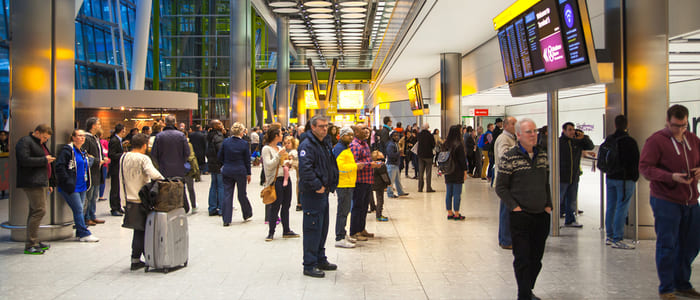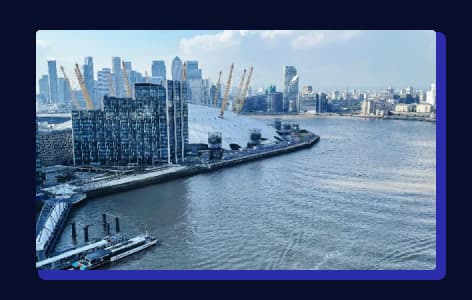
If you’re planning a layover in the UK, make sure you understand the latest UK transit rules for 2026, whether you need a UK transit visa or an ETA for UK transit. This guide explains when a visa or ETA applies, who qualifies for exemptions, and what to expect during airside or landside connections.
Do I need a visa for a UK layover?
All non-UK citizens and residents must have a visa or ETA to transit through the country to another destination.
Whether you need a standard visa, a UK transit visa or an ETA depends on the following:
- Your nationality
- Your final destination
- The duration and location of your layover
- Your travel route (UK airside vs. landside transit)
The sections below explain the difference between each option.
UK transit visa requirements
You’ll need a UK transit visa if any of the following applies to you:
- You’re not from a visa-exempt country (ETA required)
- You’re changing flights in the UK on your way to another country
- You plan to pass through UK border control for less than 48 hours
There are 2 types of UK transit visas:
- Visitor in Transit Visa (landside): Required if you need to leave the airport or pass through border control.
- Direct Airside Transit Visa: Required if you stay in the international transit area and do not pass through border control.
Transit visas are valid for up to 48 hours. You cannot use them to stay or travel in the UK.
If you plan to stay in the UK for more than 48 hours you’ll need to apply for a Standard Visitor Visa instead.
Do I need an ETA for UK transit?
The UK has expanded its Electronic Travel Authorisation (ETA) system to all visa-exempt nationalities.
UK transit rules for 2026 state if you’re from one of the countries listed below you must obtain an ETA to transit:
- Andorra
- Antigua and Barbuda
- Argentina
- Australia
- Austria
- The Bahamas
- Bahrain
- Barbados
- Belgium
- Belize
- Botswana
- Brazil
- Brunei
- Bulgaria
- Canada
- Chile
- Costa Rica
- Croatia
- Cyprus
- Czechia
- Denmark
- Estonia
- Finland
- France
- Germany
- Greece
- Grenada
- Guatemala
- Guyana
- Hong Kong Special Administrative Region
- Hungary
- Iceland
- Italy
- Israel
- Japan
- Kiribati
- Kuwait
- Latvia
- Liechtenstein
- Lithuania
- Luxembourg
- Macao Special Administrative Region
- Malaysia
- Maldives
- Malta
- Marshall Islands
- Mauritius
- Mexico
- Federated States of Micronesia
- Monaco
- Nauru
- Netherlands
- New Zealand
- Nicaragua
- Norway
- Oman
- Palau
- Panama
- Papua New Guinea
- Paraguay
- Peru
- Poland
- Portugal
- Qatar
- Romania
- Samoa
- San Marino
- Saudi Arabia
- Seychelles
- Singapore
- Solomon Islands
- South Korea
- Slovakia
- Slovenia
- Spain
- St Kitts and Nevis
- St Lucia
- St Vincent and the Grenadines
- Sweden
- Switzerland
- Tonga
- Tuvalu
- United Arab Emirates
- United States
- Uruguay
- Vatican City
Check the ETA requirements to know exactly what you need to process your application.
UK layover requirements summary
Here’s an overview of the UK’s transit policy, based on your status:
It’s always best to check official sources for the most up-to-date entry rules.
Layover in the UK: common scenarios
Here are some examples of situations you may find yourself in:
- Short stopover in London Heathrow or Gatwick (airside transit): You’ll need either a Direct Airside Transit visa or an ETA.
- Changing airports (e.g., Heathrow to Stansted): You must pass through border control so you’ll need either a Visitor in Transit Visa or an ETA.
- Overnight layover with a hotel stay: Requires landside transit, so check if you qualify for ETA or need a transit visa.
Most common layover airports in the UK
Many international travellers connect through major UK airports. Here are the busiest ones for layovers and connecting flights:
- London Heathrow (LHR) – Largest UK airport, major hub for international transfers
- London Gatwick (LGW) – Second busiest, often used for budget airlines and European connections
- Manchester (MAN) – Key hub for transatlantic and European flights
- London Stansted (STN) – Popular with low-cost carriers
- London Luton (LTN) – Frequently used for short-haul European routes
- Birmingham (BHX) – Central UK location, moderate number of international connections
- Edinburgh (EDI) – Main gateway for flights between Europe and Scotland
- Glasgow (GLA) – Important for flights to/from North America and Europe
- Bristol (BRS) – Regional airport with growing international routes
- Newcastle (NCL) – Serves Northern England with some transatlantic and European connections
Before booking your flights, check if your layover involves changing terminals or airports. This affects whether you'll need an ETA or transit visa.
Transiting in the UK with checked vs carry-on luggage
Whether your layover in the UK is airside or landside often depends on your luggage arrangement. If your airline checks your bags all the way to your destination, you may remain airside during the connection.
However, if your luggage must be collected and re-checked, you will almost certainly need to clear UK immigration before reaching the departures area. This usually means you need either a UK ETA or transit visa, depending on your nationality and your total time in the country.
Make sure to confirm the baggage handling arrangements with your airline well before travel, so you can be sure you have the correct documentation.
Preparing for transit in the UK
Even short UK layovers can be complex — know the rules and travel prepared.
Here’s how to prepare for a smooth transit:
- Check both airline and UK border policies before you fly
- Try to book all legs of your journey with the same airline
- Avoid booking tight connections when switching airports
- Apply for your ETA at least 2 days before travel
Required transit documents
Even if you're not entering the UK, border or airline staff may check your documents during your layover or stopover. Be prepared to show:
- Valid passport: Must be valid for the full duration of your journey
- UK ETA or transit visa: Depending on your nationality and route
- Confirmed onward ticket: Proof that you're continuing to a third country
- Visa or entry permit for final destination: Required if your next stop needs one
- Proof of funds: Occasionally requested to confirm you can support yourself during the journey
- Travel insurance : Not always mandatory but sometimes asked for
- Hotel booking (if landside layover): Especially for overnight stays in the UK
If you're switching airports or collecting baggage, you're more likely to go through UK border control. In that case, your ETA or transit visa and onward travel proof become essential.
Always travel with printed and digital copies of key documents to avoid delays or denied boarding.
Arriving for a connecting flight in UK
Here are some of our expert tips for a smooth transit in the UK:
- Confirm with your airline if you need to collect checked luggage
- If collecting luggage, you’ll need to pass through border control = ETA or visa likely required
- Allow at least 3 – 4 hours between flights, especially if changing terminals
- Keep a printed copy of your ETA or visa, just in case
The more prepared you are, the better chance you have of a smooth entry process.
Benefits of applying for your transit ETA with Etauk.com
Many travellers choose us for added speed, clarity, and support.
Here’s why:
- Application reviewed by UK travel experts
- 1-hour priority processing available
- Built-in form tips to avoid errors
- Customer support in your language
- Email recovery if you lose your confirmation
- Full refund if your application is denied
We’ve already helped thousands of travellers apply for their UK ETA with confidence.
Avoid mistakes, delays, and confusion. Get your ETA fast and stress-free.

